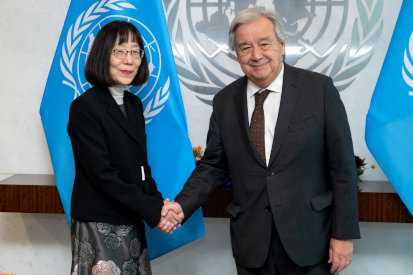ICC President Tomoko Akane met with UN Secretary-General António Guterres on 28 October 2024 ©UN Photo/Mark Garten

On October 28, 2024, Judge Tomoko Akane, President of the International Criminal Court (ICC), addressed the United Nations General Assembly (UNGA) to present the Court’s annual report. This marked her first appearance before the UNGA since assuming the role of ICC President. In her address, President Akane emphasised the Court’s growing workload, highlighted judicial milestones, and underscored the importance of cooperation among UN member states in upholding international justice.
Unprecedented demand for ICC’s judicial work
Reflecting on the past year, President Akane noted that the ICC has seen a historic surge in demand for its services, citing numerous investigations, pre-trial proceedings, trials, and appeals. She detailed the progress of judicial processes and reparations efforts, highlighting the latter as a critical element of the ICC’s work in addressing the suffering of victims of international crimes.
“International atrocities that shock the conscience of humanity are being committed in many parts of the world at this very moment,” she stated, emphasising the urgent relevance of the ICC in today’s global landscape. She further expressed the existential importance of the ICC’s mission, as outlined in the Rome Statute, to prevent and prosecute the gravest international crimes.
Challenges and threats to justice
However, President Akane conveyed deep concern over threats facing the Court’s work, mentioning an unprecedented rise in political pressure and coercive measures aimed at undermining the ICC’s independence. “We cannot give up. We will not give up,” she declared, affirming the Court’s commitment to uphold justice regardless of these challenges. President Akane reaffirmed the ICC’s impartiality and legal integrity, stating, “We are only bound by the law and we do not change the course of our actions due to threats, be they political or of another nature.”
The President emphasised that enhancing the ICC’s security is a high priority for its leadership and urged UN member states to take preventive and responsive measures to ensure the Court’s operations are safeguarded from external threats.
Importance of cooperation and legal obligations of States
A significant portion of President Akane’s address focused on the critical need for cooperation from States Parties. She reminded member states that cooperation is not merely desirable but a legal obligation under Part 9 of the Rome Statute. She particularly addressed the need for States to enforce arrest warrants issued by the ICC’s Pre-Trial Chambers, calling it an essential step in supporting the Court’s mandate. “The obligation to arrest and surrender is one of the means to give effect to the obligation to cooperate with the Court,” she said, urging states to actively uphold these commitments.
Expanding the ICC’s reach through universal ratification
President Akane reiterated the ICC’s commitment to expanding its support network by encouraging the ratification of the Rome Statute, the treaty that established the ICC. She acknowledged the contributions of civil society in raising awareness and promoting the universal adoption and implementation of the Statute. The ICC will continue to advocate for broader ratification, strengthening its global mandate to bring justice to victims of international crimes.
An appeal to defend the Rule of Law
In concluding her address, President Akane shared her thoughts for civilians currently suffering from the impacts of atrocities worldwide, for whom international institutions like the ICC represent “the last glimmer of hope.” She urged the international community to uphold the principles of the Rome Statute, emphasising that justice and accountability must prevail over power and impunity. “It is up to the international community to decide whether the rule of law at the international level should be defended or whether we ought to revert to the rule of power,” she asserted.
Strengthening partnership with the United Nations
During her visit to New York, President Akane also met with UN Secretary-General António Guterres, expressing the ICC’s appreciation for the continued support of the United Nations. The ICC has benefited from cooperation with various UN entities, departments, and field representatives, which has been essential for its operational success. President Akane also held discussions with the Acting Under-Secretary-General for Legal Affairs and UN Legal Counsel, Stephen Mathias, to explore further opportunities to enhance collaboration between the ICC and the UN in promoting international justice.
President Akane’s address underscored the ICC’s unwavering dedication to holding perpetrators of serious international crimes accountable. In the face of unprecedented challenges, she reaffirmed the Court’s commitment to independence, justice, and the protection of human rights, appealing to the international community to support the ICC’s vital mission.
Nyman Gibson Miralis provides expert advice and representation in cases of international criminal law.
Contact us if you require assistance.


